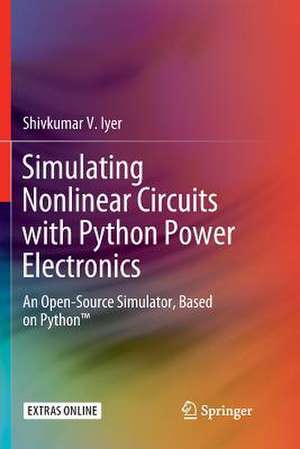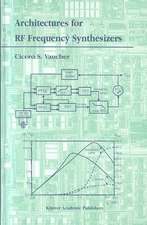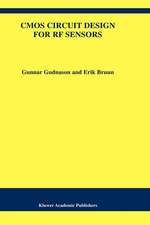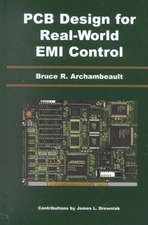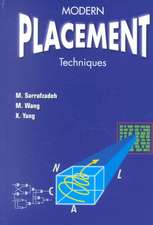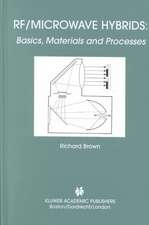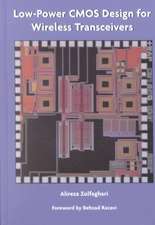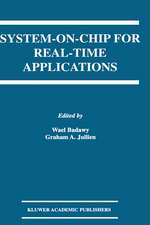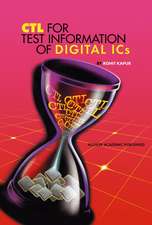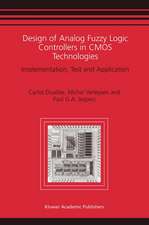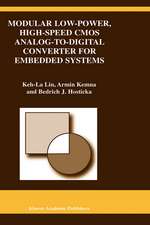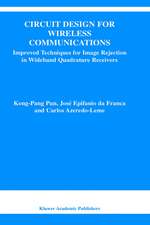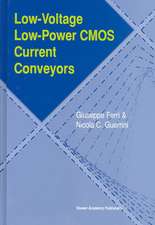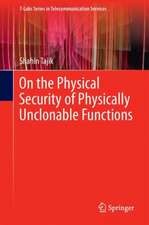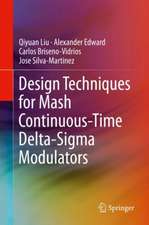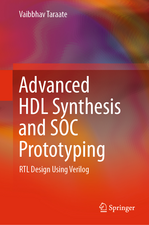Simulating Nonlinear Circuits with Python Power Electronics: An Open-Source Simulator, Based on Python™
Autor Shivkumar V. Iyeren Limba Engleză Paperback – 4 iun 2019
| Toate formatele și edițiile | Preț | Express |
|---|---|---|
| Paperback (1) | 524.22 lei 6-8 săpt. | |
| Springer International Publishing – 4 iun 2019 | 524.22 lei 6-8 săpt. | |
| Hardback (1) | 699.77 lei 6-8 săpt. | |
| Springer International Publishing – 6 feb 2018 | 699.77 lei 6-8 săpt. |
Preț: 524.22 lei
Preț vechi: 616.74 lei
-15% Nou
Puncte Express: 786
Preț estimativ în valută:
100.30€ • 104.74$ • 82.83£
100.30€ • 104.74$ • 82.83£
Carte tipărită la comandă
Livrare economică 15-29 aprilie
Preluare comenzi: 021 569.72.76
Specificații
ISBN-13: 9783319892658
ISBN-10: 3319892657
Pagini: 215
Ilustrații: X, 215 p. 117 illus., 26 illus. in color.
Dimensiuni: 155 x 235 mm
Greutate: 0.33 kg
Ediția:Softcover reprint of the original 1st ed. 2018
Editura: Springer International Publishing
Colecția Springer
Locul publicării:Cham, Switzerland
ISBN-10: 3319892657
Pagini: 215
Ilustrații: X, 215 p. 117 illus., 26 illus. in color.
Dimensiuni: 155 x 235 mm
Greutate: 0.33 kg
Ediția:Softcover reprint of the original 1st ed. 2018
Editura: Springer International Publishing
Colecția Springer
Locul publicării:Cham, Switzerland
Cuprins
Introduction.- Introduction to Python.- User Interface.- Interface for User Control Functions.- Case Study - Shunt VAR Compensator.- Nodes, Branches and Loops.- Circuit analysis - Loop analysis.- Circuit analysis - Nodal analysis.- Conclusions.
Notă biografică
Shivkumar Venkatraman Iyer is an independent researcher, based in Toronto, Canada, with expertise in power electronics.
Textul de pe ultima copertă
This book provides readers with an in-depth discussion of circuit simulation, combining basic electrical engineering circuit theory with Python programming. It fills an information gap by describing the development of Python Power Electronics, an open-source software for simulating circuits, and demonstrating its use in a sample circuit. Unlike typical books on circuit theory that describe how circuits can be solved mathematically, followed by examples of simulating circuits using specific, commercial software, this book has a different approach and focus. The author begins by describing every aspect of the open-source software, in the context of non-linear power electronic circuits, as a foundation for aspiring or practicing engineers to embark on further development of open source software for different purposes. By demonstrating explicitly the operation of the software through algorithms, this book brings together the fields of electrical engineering and software technology.
- Written by a practicing engineer, with expertise in both power electronic circuits and Python programming, who developed an open-source circuit simulator from scratch;
- Based on a free and open source circuit simulator, which makes it accessible to everyone in the world to run the tests when reading the book;
- Supplemented by online tutorials on the simulator website, making the material vast compared to other books that are limited to selective cases.
Caracteristici
Written by a practicing engineer, with expertise in both power electronic circuits and Python programming, who developed an open-source circuit simulator from scratch Based on a free and open source circuit simulator, which makes it accessible to everyone in the world to run the tests when reading the book Supplemented by online tutorials on the simulator website, making the material vast compared to other books that are limited to selective cases
